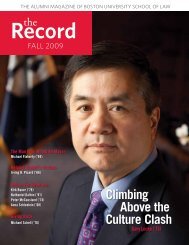the nature of representation: the cherokee right ... - Boston University
the nature of representation: the cherokee right ... - Boston University
the nature of representation: the cherokee right ... - Boston University
You also want an ePaper? Increase the reach of your titles
YUMPU automatically turns print PDFs into web optimized ePapers that Google loves.
108 PUBLIC INTEREST LAW JOURNAL [Vol. 15<br />
presenting <strong>the</strong> U.S. government’s views. 93<br />
The letter intimates that <strong>the</strong><br />
government’s efforts were on behalf <strong>of</strong> <strong>the</strong> Cherokees and that <strong>the</strong> Treaty terms were<br />
liberal, describes Cherokee opposition to <strong>the</strong> treaty, expresses concerns about <strong>the</strong><br />
<strong>nature</strong> <strong>of</strong> Cherokee leadership, and presents <strong>the</strong> treaty as unalterable. 94<br />
2. Liberal Terms?<br />
From a U.S. government perspective, not only was <strong>the</strong> treaty a necessity, but its<br />
terms were liberal, reflecting U.S. benevolence. Mason writes, “[f]rom <strong>the</strong> moment<br />
<strong>of</strong> my arrival among <strong>the</strong>m, I sought every opportunity to assure <strong>the</strong> chiefs and<br />
people that <strong>the</strong> Government was actuated by <strong>the</strong> kindest feelings towards <strong>the</strong>m, and<br />
anxious to do <strong>the</strong>m justice in every particular.” 95 When speaking to <strong>the</strong> council,<br />
Mason told <strong>the</strong> Cherokees that <strong>the</strong> President “is <strong>the</strong> true friend <strong>of</strong> <strong>the</strong> Cherokees,”<br />
and that “[t]he President feels for you as a fa<strong>the</strong>r for his children.” 96 Mason’s words<br />
to <strong>the</strong> Cherokees were not unique, for <strong>the</strong> U.S. government and Sou<strong>the</strong>rn media<br />
presented <strong>the</strong> New Echota terms as benefiting <strong>the</strong> Cherokees. Before <strong>the</strong> New<br />
Echota negotiations, <strong>the</strong> Commissioner <strong>of</strong> Indian Affairs reported to Congress that<br />
“<strong>the</strong> provisions <strong>of</strong> <strong>the</strong> treaty are so liberal, and <strong>the</strong> disadvantages <strong>of</strong> continuing<br />
among <strong>the</strong> white population that has entrenched itself on <strong>the</strong>ir borders, and even<br />
interspersed itself among <strong>the</strong>m are so glaring, that its cordial and speedy adoption<br />
might reasonably be anticipated.” 97 Georgia Governor Wilson Lumpkin wrote:<br />
“The intelligent men <strong>of</strong> all parties are availing <strong>the</strong>mselves <strong>of</strong> <strong>the</strong> liberal provisions<br />
<strong>of</strong> <strong>the</strong> Treaty . . . while we find <strong>the</strong> ignorant and misguided stand <strong>of</strong>f at a<br />
distance.” 98 President Andrew Jackson, when he first presented <strong>the</strong> basic treaty to<br />
<strong>the</strong> Cherokees in <strong>the</strong> form <strong>of</strong> a letter dated March 16, 1835, included a list <strong>of</strong> major<br />
land and financial provisions and <strong>the</strong>n stated, “<strong>the</strong>re are many o<strong>the</strong>r details<br />
favorable to you,” <strong>of</strong> which Article 7 must have been one. 99 The Sou<strong>the</strong>rn Banner<br />
93<br />
The accuracy <strong>of</strong> Mason’s transcript is verified by a nearly identical transcription<br />
included as an exhibit in a letter. Letter from John Ross to Congress, H.R. Doc. No. 99,<br />
at 33-35 (1839), micr<strong>of</strong>ormed on CIS No. 325-H99 (Cong. Info. Serv.).<br />
94<br />
Letter from J. Mason, Jr. to Joel R. Poinsett, supra note 92.<br />
95<br />
Id. at 3.<br />
96<br />
J. Mason, Jr., Address to <strong>the</strong> Cherokee nation in general council assembled, (Aug.<br />
7, 1837), in letterfromJ. Mason, Jr. to Joel R. Poinsett, Sec. <strong>of</strong>War (Sept. 25, 1837), H.R.<br />
Doc.No.99,at33,35(1838),micr<strong>of</strong>ormed on CIS No. 325-H82 (Cong. Info. Serv.).<br />
97<br />
Documents, Accompanying <strong>the</strong> Message <strong>of</strong> <strong>the</strong> President <strong>of</strong> <strong>the</strong> United States to<br />
Congress, Report from <strong>the</strong> Commissioner <strong>of</strong> Indian Affairs, Nov. 24, 1835, DAILY<br />
NATIONAL INTELLIGENCER, Jan. 1, 1836, at 2.<br />
98<br />
Letter from Wilson Lumpkin to <strong>the</strong> President and Treaty <strong>of</strong> 1835 National<br />
Committeemembers (Jun. 26, 1837), in 1LUMPKIN, supra note 3, at 121.<br />
99<br />
LetterfromAndrew Jackson, U.S. President, to <strong>the</strong> Cherokee Tribe <strong>of</strong> Indians East<br />
<strong>of</strong> <strong>the</strong> Mississippi River (Mar. 16, 1835), in MEMORIAL AND PROTEST OF THE CHEROKEE<br />
NATION, 24th Cong., 1st Sess., 90-93. William MacDonald wrote about <strong>the</strong> Jackson<br />
administration: “It was fortunate, on <strong>the</strong> whole, for <strong>the</strong> Indians that <strong>the</strong>y receivedfrom Jackson, an old frontier soldier, as generous treatment as <strong>the</strong>y did.” 15 MACDONALD,









